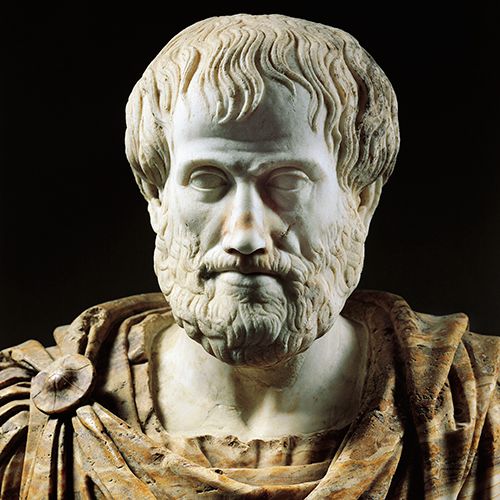Aristotle: The Philosopher Who Shaped Western Thought
Aristotle, one of the most influential thinkers in the history of Western philosophy, made profound contributions to virtually every field of human knowledge, from metaphysics and ethics to politics and biology. Born in 384 BCE in Stagira, a small town in northern Greece, Aristotle's intellectual curiosity and insatiable thirst for knowledge propelled him to greatness. In this exploration, we delve into the life, works, and enduring legacy of this towering figure of antiquity. Aristotle's early years were shaped by his upbringing in a family of physicians, which instilled in him a deep appreciation for the natural world and the importance of empirical observation. At the age of seventeen, Aristotle journeyed to Athens to study at Plato's Academy, where he quickly distinguished himself as one of the most promising students. Under Plato's tutelage, Aristotle immersed himself in the study of philosophy, mathematics, and rhetoric, laying the foundation for his future intellectual endeavors.
Aristotle's early years were shaped by his upbringing in a family of physicians, which instilled in him a deep appreciation for the natural world and the importance of empirical observation. At the age of seventeen, Aristotle journeyed to Athens to study at Plato's Academy, where he quickly distinguished himself as one of the most promising students. Under Plato's tutelage, Aristotle immersed himself in the study of philosophy, mathematics, and rhetoric, laying the foundation for his future intellectual endeavors.
Despite his admiration for Plato, Aristotle's philosophical outlook diverged significantly from that of his mentor. Whereas Plato emphasized the transcendent realm of Forms, Aristotle grounded his philosophy in the observable world of the senses. Rejecting Plato's theory of Forms, Aristotle argued that knowledge is derived from sensory experience and that the natural world can be understood through careful observation and analysis. Aristotle's systematic approach to philosophy laid the groundwork for his comprehensive system of thought, which encompassed metaphysics, epistemology, ethics, politics, aesthetics, and more. His works cover a vast array of topics, ranging from the nature of reality and the structure of the cosmos to the principles of logic and the foundations of morality.
Aristotle's systematic approach to philosophy laid the groundwork for his comprehensive system of thought, which encompassed metaphysics, epistemology, ethics, politics, aesthetics, and more. His works cover a vast array of topics, ranging from the nature of reality and the structure of the cosmos to the principles of logic and the foundations of morality.
One of Aristotle's most enduring contributions to philosophy is his theory of causality, which distinguishes between four types of causes: material, formal, efficient, and final. According to Aristotle, these causes provide a framework for understanding the processes of change and development in the natural world, from the growth of plants to the motion of celestial bodies.
In his metaphysical treatises, Aristotle explored the fundamental nature of being and existence, positing the existence of substance as the primary category of reality. Substance, for Aristotle, is that which exists independently and is capable of existing in its own right. This concept forms the basis of Aristotle's ontology, which seeks to understand the essential nature of things and their underlying principles.
In his ethical and political writings, Aristotle addressed questions of human flourishing and the good life, arguing that happiness (eudaimonia) is the highest human good and the ultimate goal of human existence. According to Aristotle, happiness is achieved through the cultivation of virtue and the pursuit of excellence (aretê) in all aspects of life. His ethical theory emphasizes the importance of moderation, self-control, and practical wisdom in achieving a life of flourishing and fulfillment. Aristotle's political philosophy, as articulated in his magnum opus, "Politics," explores the nature of the state and the principles of just governance. Unlike Plato, who advocated for rule by philosopher-kings in his ideal republic, Aristotle favored a more pragmatic approach to politics, grounded in the realities of human nature and social life. He proposed a mixed constitution that combines elements of monarchy, aristocracy, and democracy, arguing that the best form of government is one that balances the interests of the rulers and the ruled.
Aristotle's political philosophy, as articulated in his magnum opus, "Politics," explores the nature of the state and the principles of just governance. Unlike Plato, who advocated for rule by philosopher-kings in his ideal republic, Aristotle favored a more pragmatic approach to politics, grounded in the realities of human nature and social life. He proposed a mixed constitution that combines elements of monarchy, aristocracy, and democracy, arguing that the best form of government is one that balances the interests of the rulers and the ruled.
In addition to his contributions to philosophy, Aristotle made significant advancements in the natural sciences, including biology, zoology, and botany. His pioneering work in these fields laid the foundation for the modern scientific method, emphasizing the importance of empirical observation, classification, and systematic inquiry. Aristotle's "Historia Animalium" and "De Anima" are among the earliest systematic treatises on biology and psychology, providing detailed descriptions of the anatomy, behavior, and classification of animals.
Despite the breadth and depth of his contributions, Aristotle's legacy has not been without controversy. His views on slavery, women, and non-Greek peoples have been criticized for their ethnocentrism and lack of inclusivity. Moreover, his teleological view of nature, which posits that all things have an inherent purpose or goal, has been challenged by modern scientific discoveries. Nevertheless, Aristotle's influence on Western thought has been profound and enduring. His works were preserved and transmitted by Islamic scholars during the Middle Ages and rediscovered by Christian theologians during the Renaissance. From Thomas Aquinas to Immanuel Kant, Aristotle's ideas have shaped the thinking of philosophers, scientists, and theologians for over two millennia.
Nevertheless, Aristotle's influence on Western thought has been profound and enduring. His works were preserved and transmitted by Islamic scholars during the Middle Ages and rediscovered by Christian theologians during the Renaissance. From Thomas Aquinas to Immanuel Kant, Aristotle's ideas have shaped the thinking of philosophers, scientists, and theologians for over two millennia.
Today, Aristotle's legacy continues to resonate in fields as diverse as philosophy, psychology, political theory, and ethics. His emphasis on reason, virtue, and the pursuit of knowledge remains as relevant today as it was in ancient Greece. As we grapple with complex questions about the nature of reality, the purpose of life, and the principles of justice, we can still turn to Aristotle as a guide and a source of wisdom in our quest for understanding and enlightenment.
Furthermore, Aristotle's influence extends beyond the realm of academia, permeating various aspects of contemporary society, including education, law, and culture. His emphasis on the importance of education as a means of cultivating moral virtue and intellectual excellence has informed educational theory and practice for centuries. The concept of a liberal arts education, which seeks to provide students with a broad-based foundation in the humanities, sciences, and arts, can trace its roots back to Aristotle's belief in the importance of a well-rounded education for the development of virtuous citizens and ethical leaders.In the realm of law and politics, Aristotle's ideas about the nature of justice, the role of the state, and the principles of good governance continue to shape debates about legal theory and constitutional design. His concept of distributive justice, which emphasizes the fair distribution of resources and opportunities within society, has influenced discussions about social welfare policy and economic inequality. Likewise, his theory of constitutional government, which advocates for a system of checks and balances and the rule of law, has informed the development of democratic institutions and constitutional democracies around the world.
Aristotle's impact on literature, art, and aesthetics is also profound. His "Poetics," a treatise on the nature of tragedy and poetry, remains a foundational text in literary criticism, shaping our understanding of narrative structure, character development, and the role of art in society. Aristotle's emphasis on the importance of mimesis, or imitation, in art has influenced theories of representation and realism in painting, sculpture, and literature. In addition to his theoretical contributions, Aristotle's practical wisdom and philosophical insights continue to inspire individuals seeking guidance in their personal and professional lives. His teachings on ethics, friendship, and the pursuit of happiness offer valuable lessons for navigating the complexities of human relationships and the challenges of moral decision-making. Aristotle's emphasis on the importance of self-knowledge and self-improvement resonates with contemporary movements in positive psychology and self-help literature, which advocate for personal growth and self-actualization.
In addition to his theoretical contributions, Aristotle's practical wisdom and philosophical insights continue to inspire individuals seeking guidance in their personal and professional lives. His teachings on ethics, friendship, and the pursuit of happiness offer valuable lessons for navigating the complexities of human relationships and the challenges of moral decision-making. Aristotle's emphasis on the importance of self-knowledge and self-improvement resonates with contemporary movements in positive psychology and self-help literature, which advocate for personal growth and self-actualization.
Despite the passage of time and the evolution of human knowledge, Aristotle's ideas remain as relevant and thought-provoking today as they were in ancient Greece. His intellectual legacy serves as a testament to the power of reason, inquiry, and critical thinking in the pursuit of truth and wisdom. As we continue to grapple with the enduring questions of existence, morality, and the nature of the universe, we can draw inspiration from Aristotle's timeless wisdom and profound insights into the human condition. In this sense, Aristotle's legacy endures not only as a monument to the past but also as a beacon of enlightenment and understanding for future generations.































